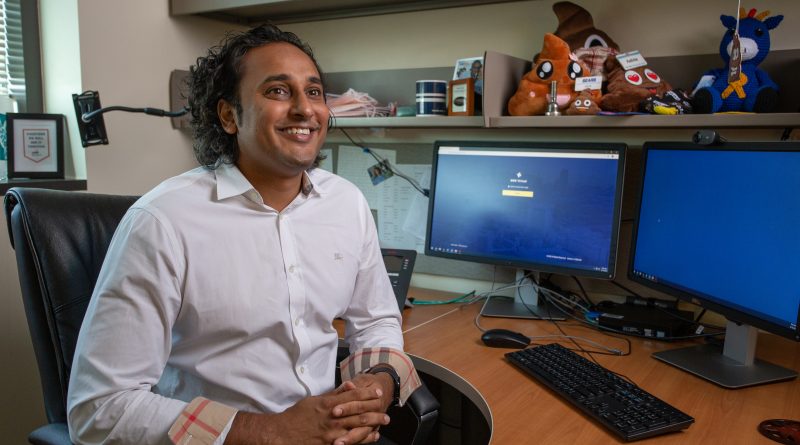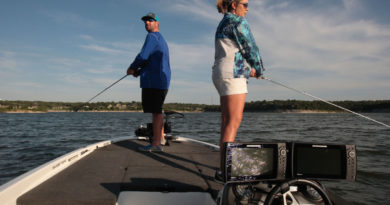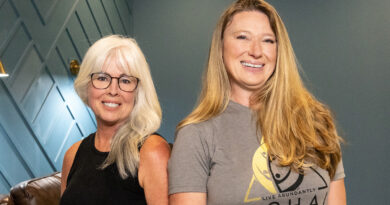A love of children motivates doctor who piloted ‘telemedicine’ at McLane Children’s
By Amy Rognlie | Photography by Rusty Schramm, BSWH
Dr. Ashis Barad has a passion for children. He can connect with them, perhaps because he’s a kid at heart.
In the midst of a pandemic, Dr. Barad, a pediatric gastroenterologist at McLane Children’s Medical Center, and other physicians are using ‘Telemedicine’ to connect with patients. He spearheaded the program at the regional children’s hospital.
“A lot of people are saying they’re doing telemedicine, but they’re really not doing anything of substance that’s actually impacting care and providing optimal care for patients,” says Dr. Barad.
Telemedicine, the remote diagnosis and treatment of patients by means of telecommunications technology, became a necessity during the height of the pandemic.
“I piloted a telemedicine program five years ago, but that was pre-COVID and insurance companies and the technology were not ready for meaningful telemedicine. But then comes March 10, and the world changes. Literally, our clinic closes and it’s just game on and everybody is scrambling,” Dr. Barad says.
Dr. Barad, a graduate of both the University of Texas and Texas Tech, has practiced pediatric medicine at McLane’s for 10 years and also has a clinic in Round Rock.
“I have a passion for kids and discovered early on that I have a gift for being able to connect with kids,” he says. “That’s probably because I am a kid in an adult body.”
Dr. Barad and his wife, Alicia, a pediatric occupational therapist, have two children of their own. Their son, Ronin, is 9 and was their only child until Ella came into their lives three years ago. She was one of Dr. Barad’s hospital patients.
She was 2 months old, severely neglected, and starved. “I don’t think she would have made it another day,” he says. “I’ve seen difficult things in my career, and I don’t know what was different about this one. But two months later, Alicia and I brought her home. It was a difficult but rewarding journey.”
He pauses, “Kids are so resilient. They are so amazing. I see so many sick, sick kids, whether they have cancer, or whether they have a chronic illness or whether they’re going to have a shortened life expectancy with cystic fibrosis … you would have no idea that they have a chronic illness or they’re not going to make it. They always inspire me. They are dealing with so much, but they always have a smile on their face.”
Dr. Barad’s passion for children extends to caring for all patients, and in the midst of the pandemic, the question became, “How do you provide the same level of care that you normally provide, especially with people who aren’t comfortable with technology? You have orthopedic surgeons; cardiothoracic surgeons; endocrinologists who don’t even do FaceTime with their kids and now they’re having to see 20 patients a day from home on their own wi-fi,” Dr. Barad says.
However, after approximately half a million provider-to-patient video visits from March through August, it’s safe to say that McLane Children’s and Baylor Scott & White Hospital providers have plunged headfirst into telemedicine.
“At first, telemedicine was a complete replacement of care. Now, we view it as a supplement to in-person care,” says Dr. Barad. “For example, we can do a quick five-minute check-in with a patient to see how they are doing with their meds or if we need to tweak something in their care plan.”
Dr. Barad is also excited about the wider possibilities that telemedicine affords to patients through unique programs he and his colleagues are implanting at McLane’s and BSW. “How many lives can we touch through this?” he asks.
“Now folks who live in other areas can see a pediatric specialist—even within a day of calling for an appointment. You can live in the panhandle and see a specialist at McLane’s,” he says. “My personal passion is to provide better care for all patients regardless of socioeconomic status or racial or even geographic divide.”
Also developed under Dr. Barad’s leadership and in conjunction with the digital health office at BSW, the Digital Health Journey program tracks those patients who have COVID or are suspected positive for the virus. This outpatient program provides the participants with twice-daily contact with providers.
“We treat people better when we have access to frequent data and are able to react real-time to their needs,” Dr. Barad says. “BSW as a whole is committed to this.” So committed, in fact, that BSW is building their own video visit software from the ground up while pioneering the usage of peripherals such as blood pressure machines, pulse oximeters and blood-sugar monitoring devices.
“Instead of sending a patient to a pharmacy to take their blood pressure, providers will give patients the actual hardware that will then transmit the data directly to BSW’s online patient portal, MyBSWHealth.”
For inpatient application, Dr. Barad and his colleagues have created a program called BSW Rounds and BSW Meet that allows all providers, from dieticians to surgeons and social workers, to be on the same page and virtually visit with each patient. The application also allows patients to add family members or loved ones to their virtual visits with their providers.
So how does a pediatric gastroenterologist become the guiding force behind such a far-reaching paradigm shift?
“I enjoy it and took it upon myself at that time when everyone was really struggling. I have a passion for it. Not that I have all the answers, but I felt some personal responsibility to help everyone out and disseminate as much information as I could. I love working for BSW and McLane’s because we care for all people regardless of their socioeconomic status. I’m really proud of our model.”




